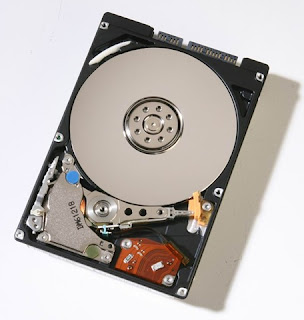The hard drive is where all your files and programs are stored. The three main features to look out for in a hard drive is the speed, size, and the type of interface.
But first, let’s take a little look into how hard drives work.
How Hard Drives Store Data
In a nutshell, hard drives store information by manipulating magnetic fields over the moving surface of a disk coated with a magnetic material. This use of magnetism to store information is very similar to how tape or video recorders work.
A hard drive stores digital data as magnetic variations on the surface of the disk. A bit (binary digit, the building block of all data within a PC) represents a 0 when magnetized in one orientation, and a 1 when magnetized in another.
Each individual disk inside a hard drive is called a platter. Large hard drives contain several platters and use both sides of each platter for storage. The drive contains a motor that spins the platters at speeds from 5400 to 15,000 rotations per minute (rpm).
The Speed of Hard Drives
So basically, the faster a drive spins, the faster you can access and transfer data. Most of the best hard drives these days have a speed of 7200rpm. You don’t want anything less than this, as you will notice annoying delays between reading and writing data.
If you want a faster hard drive you can find drives with 10,000rpm. The best hard drives available have speeds reaching 15,000rpm, although you probably won’t need such a drive for home computer use. The faster you go, the more you are going to pay, so I would just recommend sticking to a 7200rpm hard drive, it’s fast enough for most people.
What Size Do You Need?
Hard drives come in all different sizes, ranging from 80GB to 200GB, to even 500GB and more. Purchase the largest hard drive you can afford, but also take into account what you will use it for, as you don’t want to waste money on space you don’t need.
For normal home use these days you will probably need around 200GB to 400GB. If you are going to store lots and lots of software and data (perhaps large games), you might need more. So the size you choose all depends on what you need. Those who wish to store lots of video data or lots of games will require huge hard disks, such as 500GB or even bigger.
What Hard Drive Interface to Choose?
The hard drive interface is the hardware that manages the exchange of data between a computer and the hard drive. The most common interface used is ATA (Advanced Technology Attachment). ATA comes in two forms, the original ATA (also known as Parallel ATA, or PATA) and the newer, faster SATA (Serial ATA).
Then there’s the Small Computer System Interface (SCSI), which is mainly used on servers and high-end workstation PCs. SCSI is the fastest and consequently the best hard drive interface available, but it’s also considerably more expensive than SATA. It’s also fairly safe to say that you won’t need a SCSI hard drive.
So with SCSI out of the equation for most users, I would consider getting a hard drive with an ATA interface, preferably SATA if your motherboard supports it.
Conclusion
This article has explained the different considerations you should be aware of when buying your new hard drive. Choose a hard drive that is large enough for your needs, fast enough for your liking, and has an interface type that is efficient and is supported by your motherboard

Comments
Post a Comment